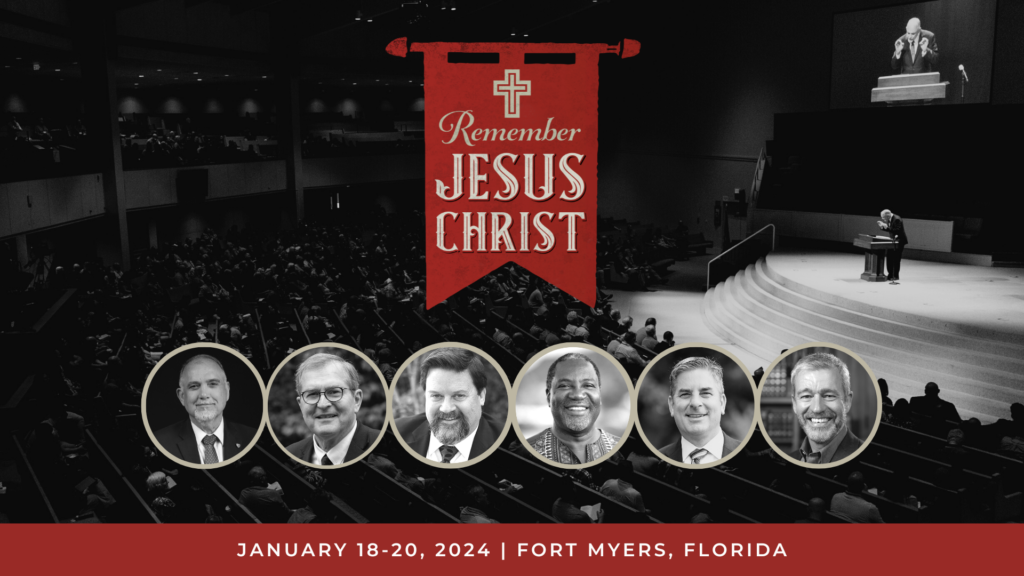This article is part 7 in a series by Tom Nettles on Remembering Jesus Christ. (Part 1, Part 2, Part 3, Part 4, Part 5, Part 6).
Possibly, the earliest post-Pauline, post apostolic literature that we have is in the letter of Clement of Rome to the Church in Corinth. Most likely this was written around 95-96 A. D, and persons appointed by the apostles still held office in the church but were being pressed out of leadership by a younger generation. Clement wrote, “For we see that you have removed certain people, their good conduct notwithstanding, from the ministry which had been held in honor by them blamelessly.” [Michael Holmes, Ed. and Rev. The Apostolic Fathers, second edition, Baker Book House, 1989, 53] Clement lamented that because of one or two persons, the ancient church of the Corinthians was “rebelling against its elders” thereby heapjng “blasphemies upon the name of the Lord” and by their “stupidity” were creating danger for themselves. [Holmes, 55]
In order to counter this egregious violation of Christian fraternity and even apostolic authority, Clement reached deeply into the theology of the Bible as seen most clearly in the condescension of Christ to encourage that church to correct their error. In the process of his argument, we find evidence of strong development of a comprehensive biblical theology, trinitarian theology, and the centrality of Christ’s having assumed human nature to bring to fruition the eternal purpose of God toward his elect. The reality of the full human nature of Christ is one of the fundamental assumptions of the argument. A creedal orderliness is present in the structure and content of this letter.
The basic Trinitarian structure of the implicit creed surrounded by certain affirmations of the peculiar operations of each person of the Trinity may be seen in several passages in Clement’s sober and stately style. Clement counters their pride by calling attention to examples of great humility in Scripture, punctuating the entire discussion with Christ’s example. The emphases on Christ’s work in his human nature are prominent. Formerly in the early days of the church, not only were they blessed with an “abundant outpouring of the Holy Spirit, but they gave heed to Christ’s words, stored them in their hearts, “kept his sufferings before your eyes.” [29] Again, to counter the recent surge of haughty self-importance, “Let us fix our eyes on the blood of Christ and understand how precious it is to his Father.” [32] Clement looked at Rahab’s scarlet thread as “making it clear that through the blood of the Lord redemption will come to all who believe.” [35] Clement quotes Isaiah 53:1-12 as an illustration of his observation, “The majestic scepter of God, our Lord Jesus Christ, did not come with the pomp of arrogance or pride … but in humility, just as the Holy Spirit spoke concerning him.” [36] He then summarized his point by saying, “If the Lord so humbled himself, what should we do who through him have come under the yoke of his grace?” [37, 38]
Clement urges peace and harmony in the church, because peace and harmony are “especially abundant to us who have taken refuge in his compassionate mercies through our Lord Jesus Christ.” Again, Christ in his humanity has become the guarantee that God’s purpose of blessing his people will certainly come to fruition: “Let us consider, dear friends, how the Master continually points out to us the coming resurrection of which he made the Lord Jesus Christ the firstfruit when he raised him from the dead.” [42]. Looking at Jacob as a man of blessings, Clement affirms, “From him comes the Lord Jesus Christ according to the flesh.” [45] Our salvation is, in fact, “Jesus Christ, the High Priest of our offerings, the Guardian and Helper of our weakness.” [48] In encouraging and commending love as the cement for true fellowship, harmony, and humility in the church, Clement again pointed to the condescension and love of Christ in taking our nature to gain for us what we lost in our foolish pride: “Because of the love he had for us, Jesus Christ our Lord, in accordance with God’s will, gave his blood for us, and his flesh for our flesh, and his life for our lives.” [56] Such a strong emphasis on substitution would be irrelevant, in fact impossible, apart from The Son of God’s coming by true human birth in a true human nature.
Always resident in each argument of the centrality of Christ in his true fleshly suffering is a reminder of the trinitarian arrangement of gospel truth. “The apostles received the gospel for us from the Lord Jesus Christ; Jesus the Christ was sent forth from God. So then Christ is from God, and the apostles are from Christ. Both, therefore, came of the will of God in good order. Having therefore received their orders and being fully assured by the resurrection of our Lord Jesus Christ and full of faith in the Word of God, they went forth with the firm assurance that the Holy Spirit gives, preaching the good news that the kingdom of God was about to come.” [Holmes, 51.]
Knowledge of these things does not come through any private intuition but from the very oracles of God,–“For thus says the Holy Word” [59]. The apostle Paul already had written to this church about their tendency to factions—“Truly he wrote to you in the Spirit about himself and Cephas, and Apollos.” Rather than being contentious toward one another, they should be “contentious and zealous” about the “things that relate to salvation.” For these things “You have searched the Scriptures which are true, which were given by the Holy Spirit; you know that nothing unrighteous or counterfeit is written in them.” [53] By them the church should know that only the ungodly thrust out the holy. As Clement multiplied the scriptural examples of God’s blessings to the humble, and the close alignment that humility and holiness have with each other, he inserted, “For you know, and know well, the sacred Scriptures, dear friends, and you have searched into the oracles of God. We write these things, therefore, merely as a reminder.” [57]
Clement regularly points, not only to the voluntary humility of Jesus Christ for our salvation, but to the final glory of Christ. The harmony of the entire creation shows God’s goodness to all things “but especially abundantly to us who have taken refuge in his compassionate mercies, through our Lord Jesus Christ, to whom be the glory and the majesty for ever and ever. Amen.” [40]. Election moves logically toward a display of Christ’s glory: “This declaration of blessedness was pronounced upon those who have been chosen by God through Jesus Christ our Lord, to whom be the glory for ever and ever. Amen.” [56]. Clement includes election, trinitarian perichoresis as actuating the substance of faith, and biblical authority in a statement of Christ’s salvation as an exhibition of the glory of the Father: “For as God lives, and as the Lord Jesus Christ lives, and the Holy Spirit who are the faith and the hope of the elect, so surely will the one who with humility and constant gentleness has kept without regret the ordinances and commandments given by God be enrolled and included among the number of those who are saved through Jesus Christ, through whom is the glory to him for ever and ever. Amen.” [61].
These issues are related again in a prayer of Clement, that “the Creator of the universe may keep intact the specified number of his elect throughout the whole world, through his beloved servant Jesus Christ, through whom he called us from darkness to light, from ignorance to the knowledge of the glory of his name.” [Holmes, 61] Clement closes a long prayer by again referring to Jesus Christ as the channel of glory to the Father: “You, who alone are able to do these and even greater good things for us, we praise through the high priest and guardian of our souls Jesus Christ, through whom be the glory and the majesty to you both now and for all generations and for ever and ever. Amen.” [63]. Finally, Clement glorifies God who “chose Jesus Christ and us through him to be his own special people,” looking upon such a relation as foundational to our being “pleasing to his name through our high priest and guardian Jesus Christ, through whom be glory and majesty, might and honor to him, both now and for ever and ever. Amen.” [64].
Clement remembered Jesus Christ. He saw the incarnation of Christ, his taking to himself our flesh and nature, as the model for all Christian humility and consequent unity. Jesus consummates the decree of election by shedding his blood as high priest and rising from the dead as the firstfruit for our redemption. Through him, the elect will see and find infinite joy in an eternal vision of the glory of God.
This article is part 7 in a series by Tom Nettles on Remembering Jesus Christ.
Join us at the 2024 National Founders Conference on January 18-20 as we consider what it means to “Remember Jesus Christ” under the teaching of Tom Ascol, Joel Beeke, Paul Washer, Phil Johnson, Conrad Mbewe and Travis Allen.
























